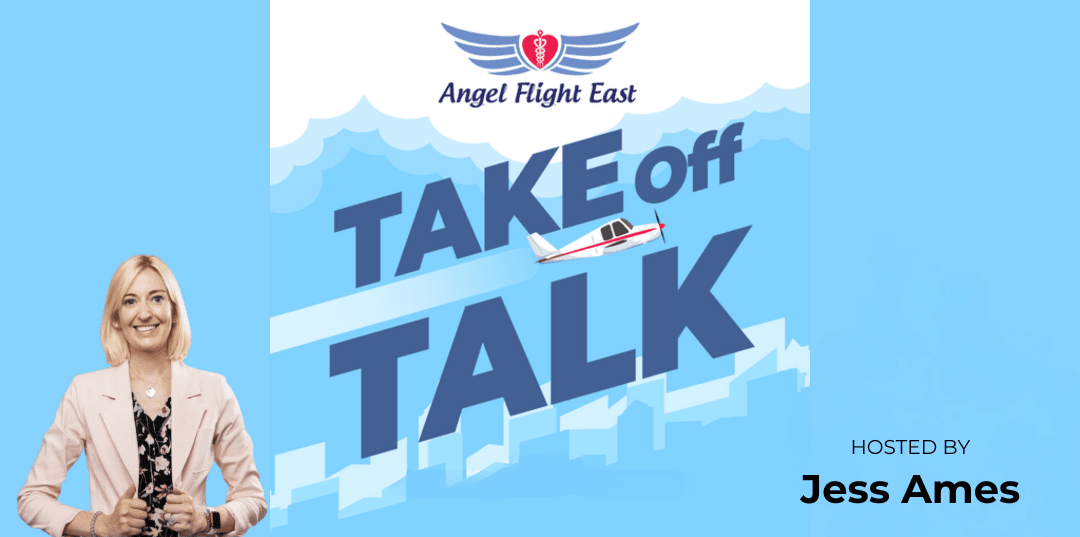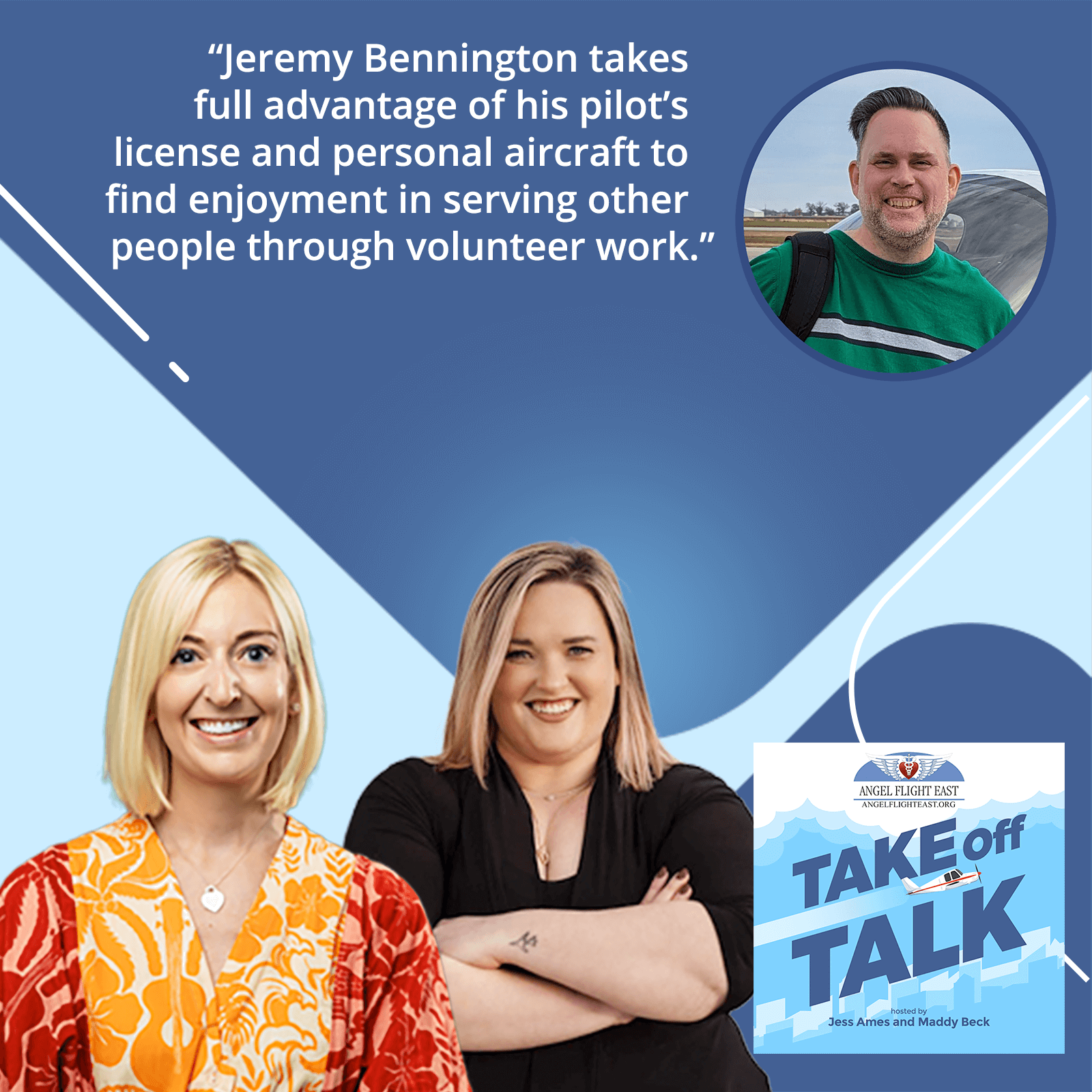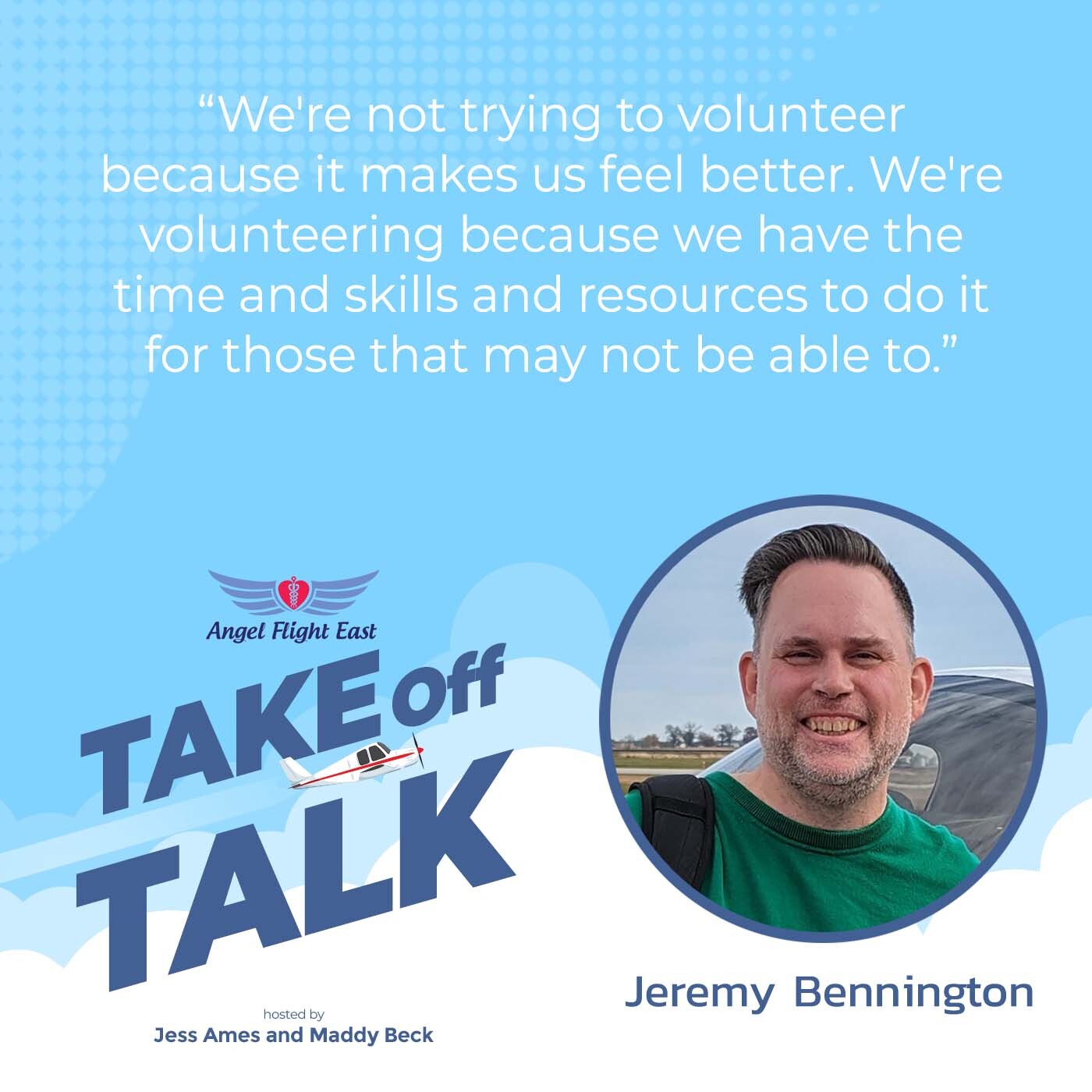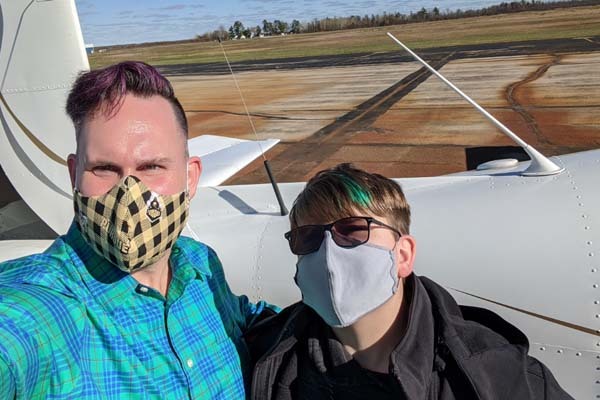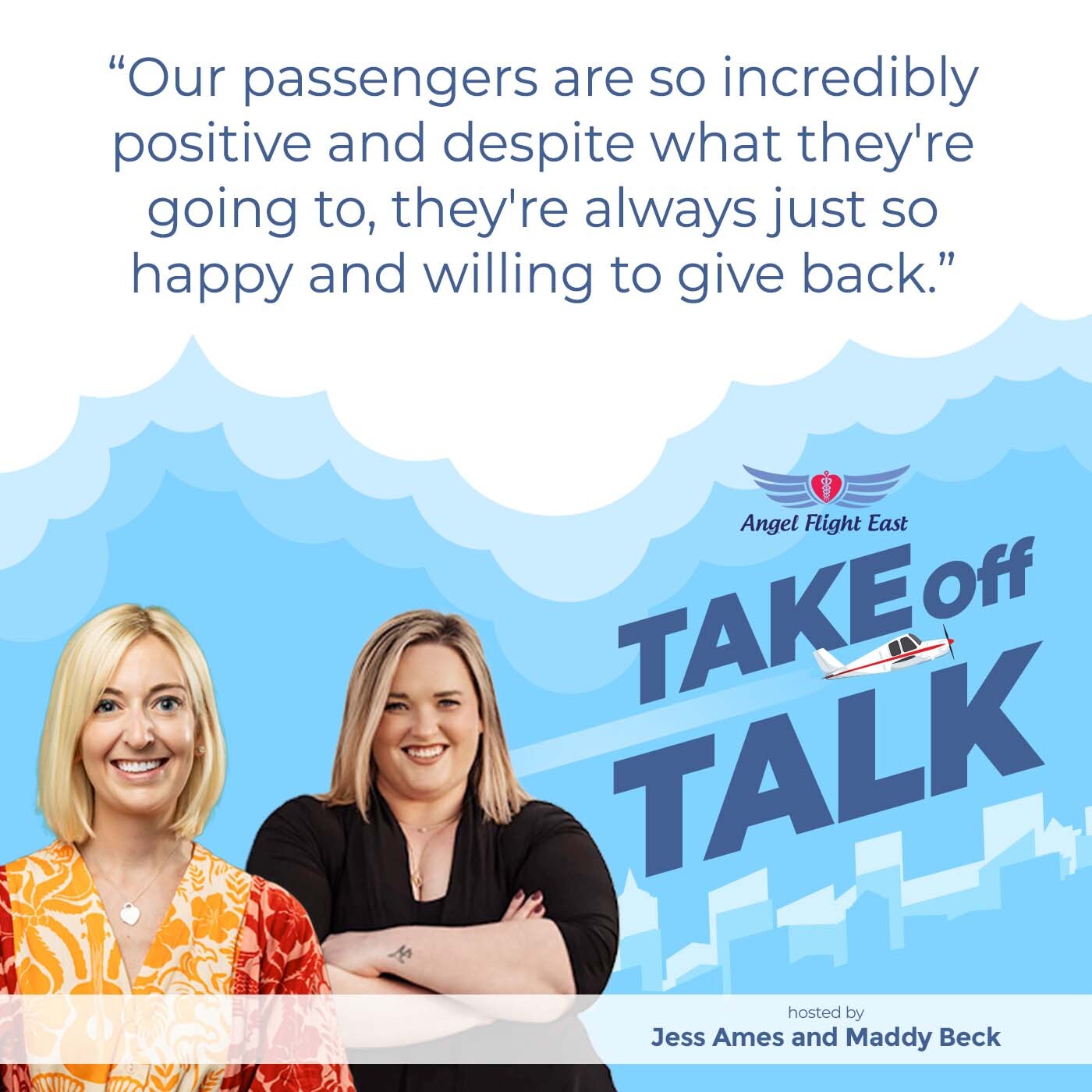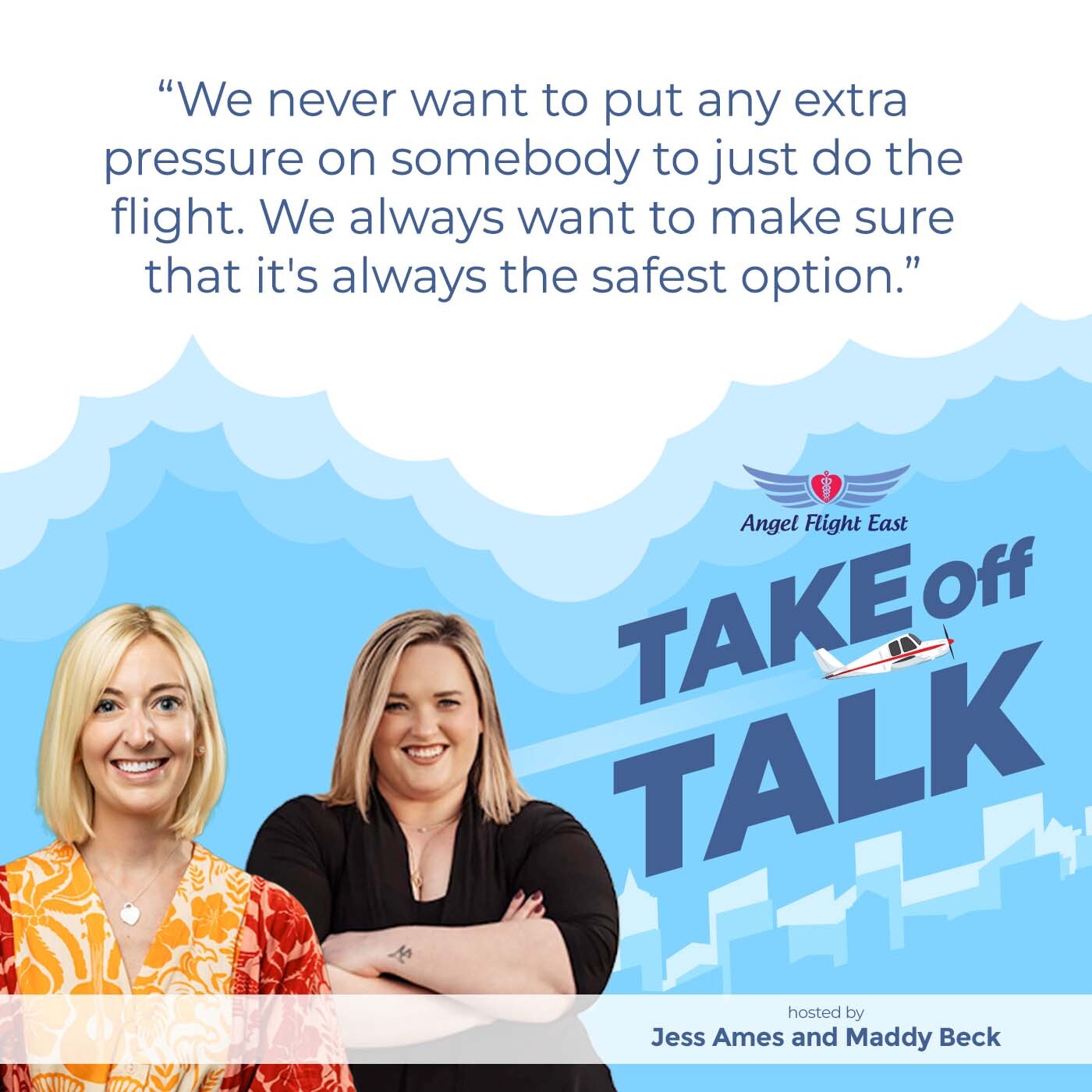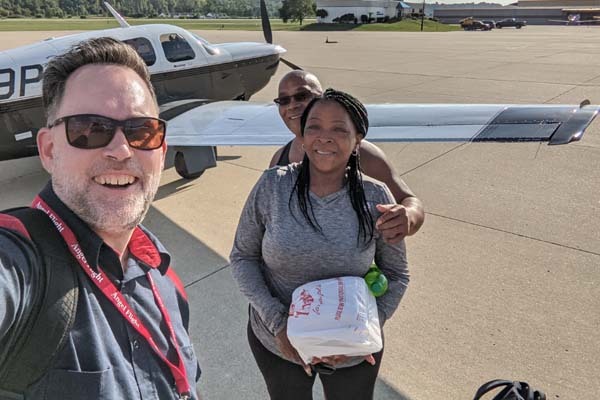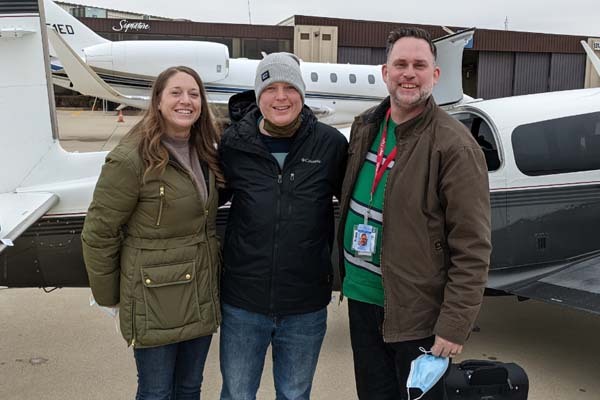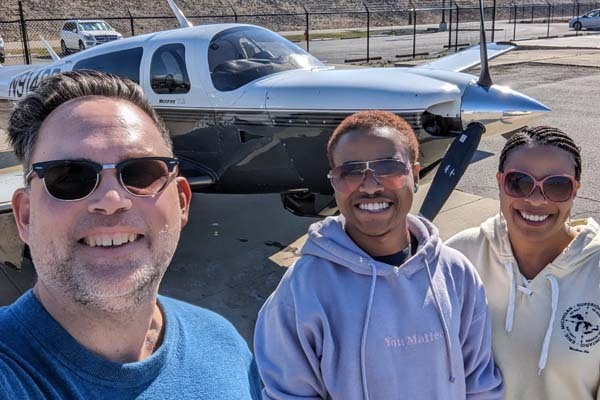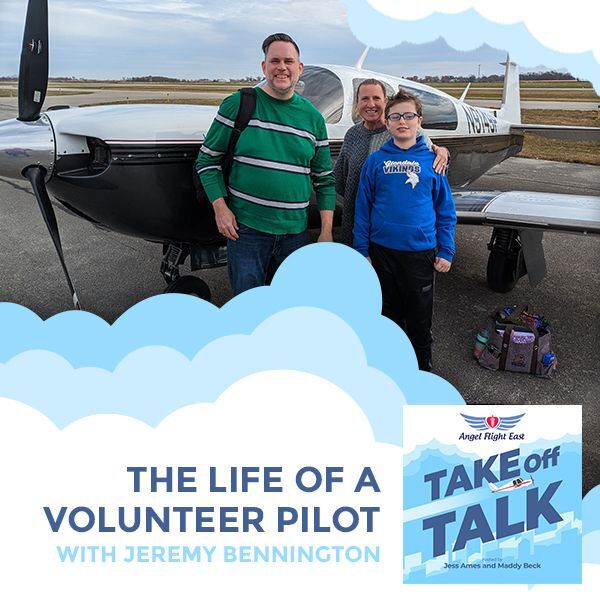
Today’s guest is Jeremy Bennington, a volunteer pilot for Angel Flight East for five years. He joins Jess Ames and Maddy Beck to share how someone from the communications industry decided to spend some of his time doing medical flights. Jeremy talks about his most memorable experiences as a volunteer pilot, particularly when flying a kid with severe disabilities who found going up on the skies extremely thrilling. Jeremy also opens up about what it is like to work with the FAA every single day and his favorite places to fly to.
---
Watch the episode here
Listen to the podcast here
Welcome back to another episode. We have a special guest, a volunteer pilot, Jeremy Bennington. How long have you been flying with Angel Flight East?
For a few years. It's been a lot of fun.
How'd you hear about us?
When I started flying many years ago, I talked to the flight school. I said, “Are there ways to volunteer?” I had obviously done it a little bit later in life, in my 30s, and had always been passionate about aviation. I never had the time or money, but I decided to pull the trigger anyway. I wanted to find a way to share. Young Eagles and charitable flights came up. One of the gentlemen in our hangars happened to be flying for Angel Flight and he shared what he had done. I thought that was fantastic. I found out you got to have a lot more experience. They gave me a couple of years to get some experience before I could volunteer.
You have flown Sandra Wright. She was chatting about you during our interview with her.
Yes. It's really interesting as a volunteer pilot to fly these different patients around and we only see a glimpse of their journey for a couple of hours, 3 or 4 hours or something tops of what for many of them is a many-year-long struggle with whatever they're dealing with. For them to be able to share and open up about their journey is just really one of the most rewarding parts of being a volunteer pilot that time when we're en route. You can either just let them conk out in the back and get some much-needed rest or let them share what they're going through. In some cases, that's pretty heavy. In some cases, it's pretty light and exciting to see how different people deal with this stuff or overcome it. Sandra was definitely a great patient to fly around.
We actually are doing patient surveys, so just getting to know what patients are going through because, as you said, they tell you their story. We're not the ones who get to spend an hour and a half or two hours with them going to treatment or really in general. We're just calling them up and being like, “Let's talk.” Many people that I have talked to personally, we've probably done about 15, 20 surveys now, and everybody has said the pilots are their biggest support group.
That's amazing to hear. Obviously, we'd all hope if we were to face some medical issue that our family and our doctors and all kind of stuff, but to hear the encouragement that they get from us helps in any way, that's great.
It's so cool to see how everybody's hand being in the pot has such a bigger impact than they even know. It's my favorite part, I think.
That's part of volunteering. Whether it be, as a volunteer pilot like we're talking about, at a food bank or whatever it is that each person's called to do, it's exciting to hear that reward. We’re also trying to be very humble and selfless that we're not trying to volunteer because it makes us feel better. We're volunteering because we have the time, skills and resources to do it for those that may not be able to. As a pilot, we're a very small group in the nation that have pilot's licenses, let alone the means to rent or own an aircraft. We all should be volunteering to share that resource and those skills for those that need that help. To hear that they're getting more than the transportation out of it is icing on the cake.
Would you say that that is your why for signing up to fly with Angel Flight?
Absolutely. The whole reason is, how lucky are we to be pilots, to have resources, to have these airplanes? We may use them for work, we may use them for fun and family trips, but that's all a little bit self-centered. How do we use those resources for people around us? To hear the stories and the way that it's impacted the people that I've flown, which is only a small amount of the total people that obviously Angel Flight East flies, reinforces the fact that we need more people to be volunteering to help. There are a lot of people in need, and they desperately need that. That was part of the compelling reason and it's been reinforced every time I do it.
One of our big hurdles as the outreach team too is that we always tell people what we do and it's almost too good to be true. There are actually people out there with their own airplanes who are going to fly me and they're not going to send me a bill after the fact. We're like, “Yes. We know so many of them.” To share these stories from the pilots directly, I feel it makes such a bigger impact than us going out and telling people about it.
On the one hand, it’s expensive to fly. Even if you rent or own, you still got to pay for fuel and maintenance to the aircraft and your time. It’s funny because you sit there and you go, “That flight's going to cost me this much,” in my mind. How else would you be donating, giving that money away or using it for yourself? You really have to change the context because you know how many pilots are sitting around the airport going, “Did everybody want to go get a hamburger today?” The $100 hamburger run. We're all going to fly anyway. Otherwise, put your license in the drawer and don't rent or around an airplane. You want to fly. It's part of what you enjoy doing. Why not use that enjoyment to serve others? It's been a lot of fun.
We've heard about your flights with Sandra and that you've gotten to know the passengers that you do fly. Would you say that you have a favorite story about any of your flights or a specific passenger that's had the biggest impact on you?
There are two that come to mind. One was a mom and a child who was probably maybe 9 or 10 years old. He had some pretty severe disabilities. Partially genetic but also due to an accident. His cognitive abilities were not great. He had the cognitive abilities of maybe a six-year-old and some other substantial physical disabilities. That kid was having the time of his life. He would've thought he was in an amusement park.
For me, as the pilot, it was actually a fairly challenging flight because it was all instrument. It was a bumpy ride. I had shared that with the mom ahead of time. I said, “This is going to be not a bad flight, but I want you to know that there's going to be weather. I'm going to be concentrating on stuff. Are you okay with that?” She's like, “We got to get there and that's fine,” but we're going through some bumps, and he is throwing his arms up and having a good time.
It was great. Once that subsided and we had about 45 minutes of clear air, and I was able to talk with a mom, you talk about some heavy stuff. It's inspiring to see a parent who can still have a positive outlook dealing with all of those things. That was inspiring to see her spirit, her view on things and being able to help. That was pretty impactful. The other one that comes to mind was one that was a lot of fun. He was not a kid. He was in his twenties and getting in my mind still. He’s going back home from treatment. It was his last flight. He had been cleared by his doctors to be cancer-free. It was incredible. He was so excited to finally be free. His aunt was exhausted and fell asleep in the back of the airplane.
This kid, for two hours, was talking nonstop all the way home about all the things he could do. He had been diagnosed in high school and lost a lot of high school experiences. He never got to go to prom and do all those kinds of things that many of us have great memories of. He is in his early twenties, trying to find a job and has done some nursing school and all these different things. He had been inspired by the doctors and stuff.
He was so excited that now that he was cancer-free, he could go forward with his life. To have that energy and excitement of being free from all of these challenges he had and to see that unbridled enthusiasm for life, it was pretty inspiring. We all maybe take for granted getting up every day and going to work and doing the things we do. This kid's got a lease on life. That was cool.
I always say our passengers are incredibly positive, and despite what they're going to, they're always so happy and willing to give back. I always think our bad days are in no way in comparison to what a lot of people are going through in this world.
Certainly, there are some flights where you show up and they're drained. They're not excited. they want to get home or go to wherever they're going for treatment. You go through the normal spiel, getting them ready and helping them get on the airplane. A lot of times, you finish your safety briefing and tell them, “I’ll be quiet until I let you know we're established en route.” The next thing, you're talking to them because you've shut the engine down, and it's time to go. Those are still rewarding in a way because you've offered them not only transportation but rest. Every flight's got a different dynamic to it.
I haven't had anybody who's been angry or upset. I hear occasionally there are people that are like, “I should have just taken the airline,” but almost everybody that I've experienced has been very thankful and understanding sometimes. There have been a few flights where we've had to divert or we've had to cancel, several of those usually ahead of time. There was one where I had weather, and there was going to be no getting through it.
We had to land and worked it out. I said, “Here's about as far as I'm going to be able to get you.” By the way, I had told this guy a couple of days leading up, “The weather isn’t going to be good. We can go. If we go, we may have to stop short of getting you there. Is that going to be a problem or would you rather go commercial or rent a car or whatever you're going to do?” He's like, “No, let's go.” I said, “Here are the different towns that we could go to.” He said, “I've got family in this one.”
I think I remember this flight. Was it George Tenney?
That's right.
We love him. He is easygoing.
He's a great guy. We landed and it was 35 knots off the nose when I was landing. The winds were picking up. I go, “I got to get out of here.” I got home without a problem, but a great tailwind coming home. For any of the pilots I've talked to that I've tried to share this experience and recruit them into it, there is clear and consistent communication with the patient ahead of time of what to expect and what the options are. Keep them informed when you're on a flight. Sometimes, they can sleep the whole way because everything's fine. Do what you can but don't take risks.
"Pilots must always keep their passengers informed while in flight. This way, they can just sleep the whole way and let them know everything’s fine without taking risks."
For anybody reading, we don't take risks.
We really don't. Hopefully, all pilots subscribe to that mantra. When you've got the burden of a passenger, especially a passenger that already has a lot of other things going on in their life and it's not family and all kind of stuff, while they understand the risks and they sign the waiver, the burden is on us. We make sure that that risk is fully analyzed and compensated for. I've canceled plenty of flights, and I know that's probably a burden on them, but there's no reason to take risks. So far, it has worked out pretty well.
We never want to put any extra pressure on somebody to just do the flight. We always want to make sure that it's always the safest option. Do you do any public benefit flying with other organizations?
Lifeline Pilots and Angel Flight Central. I'm also in those circles. I know you guys coordinate a lot of that. It also helps to get some visibility on other things, especially if I'm traveling for work. I might be pretty far away from East, and so be able to see what's going on. It's nice sometimes if I have to go somewhere for work anyway, which isn't that often lately, but I could pick up a passenger on the way there or the way back. We've done that a couple of times, and it's great. Those organizations are good. Also, Young Eagles. It's another organization getting kids their first flight to expose them to aviation, which may be a good or bad thing. I took my daughter's boyfriend on her first flight and now he wants to be a pilot.
He got the bug.
I don't know how my daughter feels about me having a relationship with her boyfriend. “I'm just going to help you.” It's been fun.
What made you want to become a pilot?
I'd always been interested in aviation. I always went to the air shows as a kid and looked at airplanes, and weirdly, I was always reading accident reports. There are TV shows now and YouTube channels going to the accidents. I remember, even back in the ‘80s and ‘90s, getting ahold of the FAA and TSB reports in the library, just curious. Part of my day job is engineering, so I'm always curious about that technical like, “How did this happen?”
Many years ago, a friend of mine happened to be a pilot. I was like, “I would love to fly.” He goes, “Why haven't you?” I said, “I don't have the time and money.” He said, “You're never going to have the time or money, so either do it now or never do it. Make up your mind.” My wife happened to be in that discussion, and so she bought me a Discovery flight for my birthday without me knowing, which I'm sure she regrets now. I got the bug and it's been a lot of fun.
What is your real job?
That's one of those interesting weird terms of fate. At the time that that was happening and I learned to fly, I was in the communications industry working with cable television and some of the video technologies. I'm not going to go through my whole work experience. I ended up at my current company, which is Spirent. I'm an entrepreneur, and I got involved with their GPS technologies because I had this piloting background. I wouldn't be in my current job had I not taken a chance to just go follow my curiosity and passion to learn how to fly.
Now, as my day job, I run a part of their business that's focused on GPS technologies that go into self-driving cars, drones, military aircraft, all sorts of different things, even your smartphone. I work now a lot directly with the FAA on their emerging technologies to enable drones in your taxis. It all worked out in a weird way that I ended up doing it for fun, which actually impacted my career. I will say what most pilots say about the FAA is that they're not happy until you're unhappy.
I was going to say, what's it like working with the FAA on a daily basis, every pilot’s nightmare?
I wouldn't say that certainly the organization's different than the people. I do think the organization and the people don't strive to make our lives difficult as pilots. They just are very safety-minded. Certainly, there are things that they could do better, and I remind them of that when we're working together to try and get something done that seems to have taken a lot longer than it should have.
Their heads and minds are in the right place. They exist to expand aviation across the United States and the world and do it in a safe way. We're trying to make it possible to have commercial drone delivery flights, like the ability to deliver medical goods to hospitals using a drone or packages to your home, things like that, or infrastructure inspection, a lot of different use cases.
They want to see it happen. You start peeling back the onion of how do you do that and make sure that it's safe. There are 1,000 things that have to be considered. Until all 1,000 things are considered and dealt with and proven to be reliable and safe, they're not going to allow it. That's different than the Barnstormer days of aviation a hundred years ago, but it is where we are now. That’s sometimes frustrating to work with FAA because of that safety-minded culture, but I can't fault them for having it.
It's definitely an interesting time. Anytime I feel somebody's like, “The FAA is on the phone,” I'm like, “Why? Who do they want?” I'd be really happy to hear that they are involved and nicely involved. If you could say anything about being a volunteer pilot, what would it be?
I think one of the hardest things is just finding time. I would say that, much like we've discussed, the opportunity to share the unique talent and resources that we have as pilots with people in need or even people like Young Eagles, the other programs that wants to experience aviation, take a flight for the first time, sharing that gift with them is priceless. It's not as hard as it seems, in the sense that carrying these passengers, you think, “Are they going to be okay in a small airplane? Are they going to be able to be okay with all these challenges that we might come up with?”
The reality is, yeah, they're very much happy to get on a small airplane and get where they need to go because the alternatives are expensive and, in many cases, very difficult. If they live in a small community, especially being picked up in a rural area and go directly where they’ve got to go saves them a ton of time and sometimes literal pain. They would experience that and have to travel long distances. If that's what motivates you to volunteer, there are 100 other reasons, but it's absolutely something everybody should consider.
Where would you say your favorite place is to fly to?
It's not a volunteering place. There are probably two answers. Every pilot would say Oshkosh for AirVenture, which I go to every year and camp out with about twenty other people and fly in as a gaggle. It’s this great thing called Pirates of the North 40. The other place is Air Zoo. Kalamazoo, Michigan, which is about an hour and fifteen-minute flight from Columbus, Indiana, where we’re at, is an aviation museum. It’s on the airport property. You can literally land, taxi up to the museum and tie down and go in.
That particular hangar is a restoration hangar. You get to see all the stuff that they’re restoring and there’s actually part of a Mercury-Redstone rocket on the ramp. You can literally go up and touch it. A short walk from that hangar to the main exhibition hall, they’ve got an SR-71 Blackbird. They’ve got Tomcats. They’ve got a bunch of space and World War II stuff. It’s this hidden gem. It’s almost as good as Air and Space or the Air Force Museum in Dayton. It’s a great hidden gem. It's an hour's flight. Everybody from kids to adults enjoys it. They got a cafe for lunch. It's your perfect $100 hamburger run. I love going up there.
I'm going to have to tell Wings Field to step it up. We don't even have a restaurant here or a museum.
We have a country club that we're not a part of.
That's not as cool.
That's awesome, though. I feel like we've pretty much touched on this about focusing on volunteerism and that being a passion of yours. What is one thing that you want to leave our readers with?
I would say that volunteering's quite rewarding. We all want to fly anyway. We want to go to Air Zoo. We want to get that $100 hamburger or whatever. We’re looking for excuses to go fly. We should keep our skills sharp but also share them with others. Go do it. You don't have to be a medical expert. You don't have to be a social worker. You don't have to do all the things that you might think would need to be for a medical flight. Most of these people are getting long-term treatment for cancer or caring for somebody or along those lines.
They need an efficient way to get from point A to point B. Almost every one of them is overjoyed to have you do that. There are very few reasons why you shouldn't do it. You should find the time and go start enjoying it, even if it's one flight a year. That's one more person that gets from point A to point B and doesn't have to spend a ton of money and time to do it. You get to enjoy the time with them. Get involved. Go do it. You'll meet lots of really interesting people along the way. It's a lot of fun.
Thank you so much for joining us, Jeremy. We appreciate your time. We appreciate the time you put into this show and the time you put into the air helping our patients get where they need to go.
Thanks, Jessica and Madeline.
We appreciate you reading the show.
We even gave you guys a nickname, so if you keep coming back, we are now referring to you as our Frequent Flyers. Shout out to Frequent Flyers. There's no benefit quite like reading the two of us ramble. There are no mileage options, and you don't get discounts for showing up.
You do get moon water.
I was going to say our appreciation, but Jess can still make you the moon water. Let us know your wishes.
Thank you so much.
Important Link

